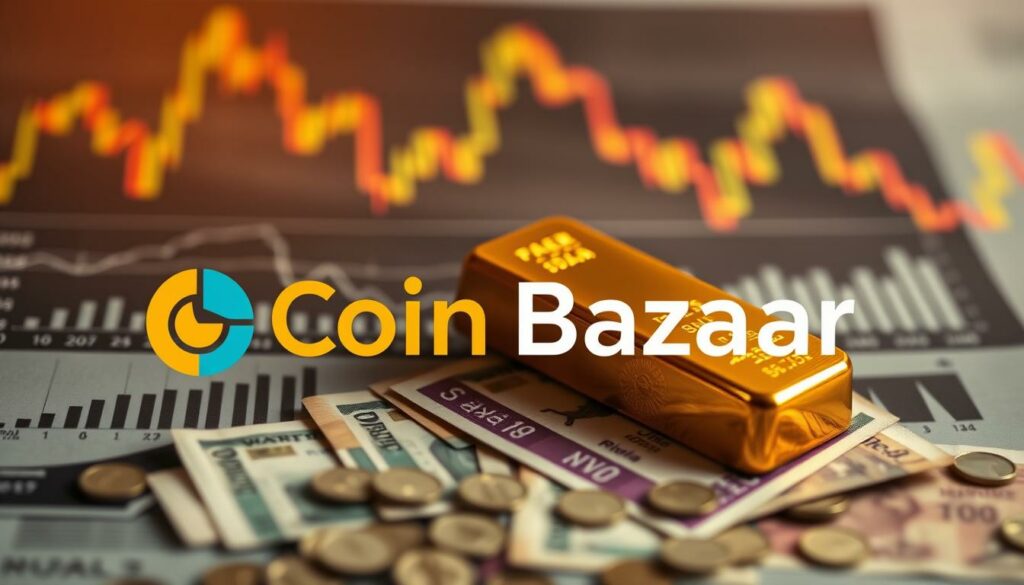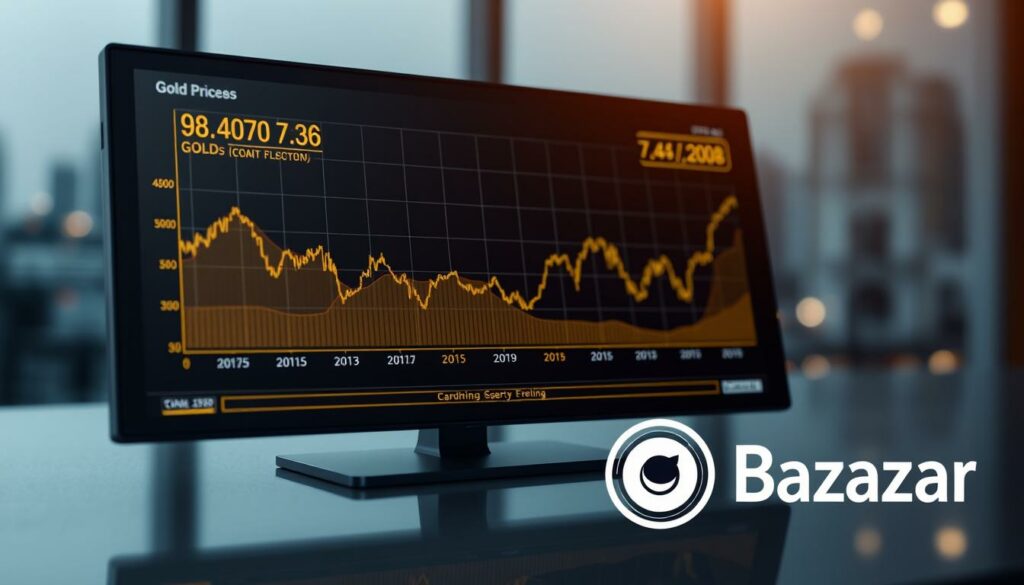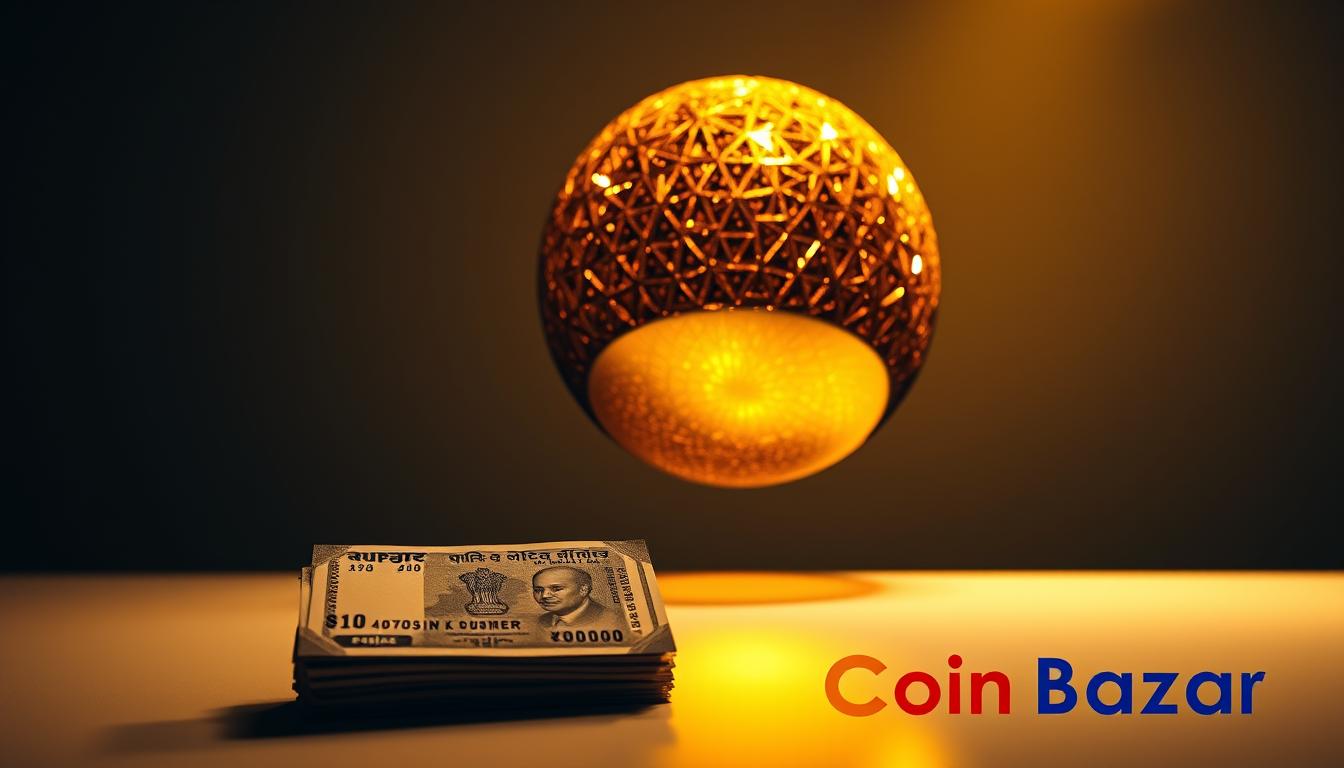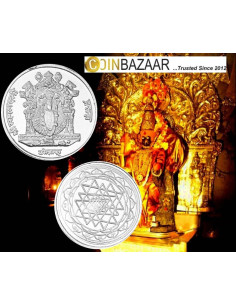Exclusive Deals & Trending Items


Divine Solitaires Diamond Engagement Ring for Women 18kt Gold Sol. Diamond 0.11 carats BIS Hallmark Certified
Shop NowHave you ever wondered why gold prices seem to change without a clear reason? There’s a big factor at work: central bank decisions. Central banks, being key players in the global economy, greatly affect gold price news and trends.
When central banks buy or sell gold, it can really move the market. This action drives gold price analysis and forecasts. Knowing about these moves can give investors and those interested in precious metals a big edge.
Key Takeaways
- Central banks play a crucial role in influencing gold prices.
- Their buying and selling activities can drive market trends.
- Understanding central bank decisions can inform investment strategies.
- Gold price news is often impacted by central bank actions.
- Analyzing central bank moves can help predict gold price fluctuations.
The Enduring Allure of Gold in Financial Markets
Gold has always been highly valued, shaping economies and cultures. It’s not just a currency but a symbol of wealth and success. This has been true across many civilizations.
Gold as a Store of Value Through History
Gold has been a safe choice for investors for centuries. It protects against inflation and is a safe haven in tough times. Its value and rarity make it a solid investment.
The history of gold prices shows it keeps its value over time. This makes it a reliable asset for investors.
Modern Role of Gold in Indian Investment Portfolios
In India, gold is a key part of investment portfolios. It’s valued not just for its worth but also as a cultural symbol. Tools like the current gold price tracker help investors stay updated.
Cultural Significance of Gold in India
Gold is deeply rooted in Indian culture. It’s a big part of weddings, festivals, and ceremonies. This cultural importance boosts gold demand in India, making it a major consumer worldwide.
Investment vs. Consumption Demand
Gold demand in India falls into two categories: investment and consumption. Investment demand focuses on holding gold as an asset. Consumption demand is for gold jewelry and ornaments.
Central banks bought 1,082 tonnes of gold in 2022, as reported by the World Gold Council. This shows gold’s lasting appeal as an investment.
- Gold is a reliable store of value.
- It serves as a hedge against economic uncertainty.
- Gold is culturally significant in India.
Understanding gold’s historical and current prices is key to smart investing. Gold’s role in diversifying your portfolio is crucial to consider.


Understanding the Fundamentals of Gold Prices
Getting to know the basics of gold prices is crucial for success in the gold market. Gold’s price has soared over 40% since January 2024. This shows how vital it is to understand what drives its value.
Supply and Demand Dynamics
The gold market follows the rules of supply and demand, just like any other. The price of gold is set by the balance between how much gold is available and how much people want. Physical demand from areas like jewelry, tech, and investment is key in this balance.
Key Factors That Influence Daily Price Movements
Many things affect gold’s price every day. Knowing these can help you make smart investment choices.
Physical Demand Factors
Gold’s physical demand, especially in countries like India, greatly affects its price. Demand surges during festivals and weddings, pushing prices up.
Speculative Market Forces
Speculative trading in gold futures and options also shapes daily prices. Market mood, influenced by economic news, global events, and central bank moves, can cause big price swings. Watching live gold price updates and studying the gold price chart can offer clues to these shifts.


By grasping these basics and keeping up with the gold price in USD, you can handle the gold market’s complexities better.
Central Banks: The Powerful Players in Global Finance
Central banks play a big role in the world’s finance. Their actions can change how we see gold prices. As an investor, knowing their role is key to smart choices.
What Are Central Banks and Their Primary Functions
Central banks manage a country’s money policy. They keep the economy stable, control inflation, and manage money. They use many tools to do this.
Monetary Policy Tools
- Setting interest rates to influence borrowing costs
- Conducting open market operations to buy or sell government securities
- Regulating reserve requirements for commercial banks
How Central Banks Influence Financial Markets
Central banks shape markets with their policies and actions. Their moves can greatly affect gold prices. For example, they’ve been buying gold fast in the last three years, which affects gold price predictions.
Market Intervention Mechanisms
- Direct intervention in currency markets
- Providing liquidity during financial crises
- Implementing quantitative easing programs
Knowing how central banks work and affect markets helps you understand gold prices better. This knowledge can guide your investment choices.
The Strategic Gold Reserves of Major Central Banks
Major central banks play a big role in gold prices. They have been adding gold to their reserves. The World Gold Council says they bought 1,037 tonnes in 2023.
Top Gold-Holding Nations and Their Reserves
The United States, Germany, Italy, France, and China lead in gold reserves. These countries keep a lot of gold. It helps keep their finances stable.
| Country | Gold Reserves (tonnes) |
|---|---|
| United States | 8,133.5 |
| Germany | 3,363.4 |
| Italy | 2,451.8 |
| France | 2,436.1 |
| China | 2,168.0 |
Why Central Banks Continue to Hold Gold
Central banks keep gold for important reasons. It acts as a crisis insurance and helps diversify away from the dollar.
Gold as a Crisis Insurance
Gold is a safe asset in economic troubles. As
“Gold is a safe-haven asset that investors turn to during times of economic stress.”
, it shows its value in crises.
Diversification from Dollar Dependence
Gold helps central banks diversify their reserves. This reduces their reliance on the US dollar. It’s key for financial stability.
Knowing about central banks’ gold reserves helps us understand gold prices and the global economy.
Interest Rate Decisions and Their Direct Impact on Gold Prices
The link between interest rates and gold prices is intricate. Knowing this can greatly affect your investment plans. Central banks, like the US Federal Reserve and the Reserve Bank of India (RBI), are key players in the gold market.
The Inverse Relationship Between Interest Rates and Gold
There’s a basic rule: when interest rates go up, gold prices tend to fall. This is because investors can get better returns from other assets. On the flip side, when rates drop, gold becomes more appealing, which can push its price up. For example, looking at the gold price chart during rate changes can offer clues.
Case Studies of Rate Hikes and Gold Performance
Looking at past data can shed light on gold’s reaction to rate changes. Let’s dive into some examples.
US Federal Reserve Rate Cycles
The US Federal Reserve’s rate decisions greatly affect global markets, including gold. When rates go up, the gold price in USD often falls because the dollar gets stronger. Yet, the outcome can differ based on other economic factors. Keeping an eye on live gold price updates can help investors stay ahead.
RBI Rate Changes and Indian Gold Market Reactions
In India, the RBI’s rate decisions also sway the gold market. Changes in rates can alter how attractive gold is compared to other investments. For instance, lower rates can make gold more appealing, possibly boosting demand and prices. Grasping these dynamics can aid investors in making smarter choices.
By keeping up with central bank actions and their effects on gold, you can tailor your investment strategy to the current market.
Quantitative Easing: How Money Printing Affects Gold Valuation
Quantitative easing, or ‘money printing,’ is key in shaping gold prices worldwide. When central banks use QE, more money flows into the economy. This can change how much gold is worth.
Understanding Quantitative Easing Programs
Quantitative easing is a way for central banks to buy securities. This adds liquidity to the economy. It can make the currency value drop and increase asset prices, like gold.
Key aspects of QE programs include:
- Injecting liquidity into the financial system
- Lowering interest rates to stimulate economic growth
- Increasing the money supply, which can lead to inflation
Historical Gold Performance During QE Periods
Gold has done well when there’s quantitative easing. More liquidity and the chance of inflation push investors towards gold.
Post-2008 QE Programs and Gold Rally
After the 2008 crisis, central banks used a lot of QE. This extra liquidity helped gold prices rise a lot.
| Year | QE Program | Gold Price Change |
|---|---|---|
| 2008 | Initial QE | +25% |
| 2010 | QE2 | +29% |
| 2012 | QE3 | +14% |
Pandemic-Era Stimulus and Gold Markets
During COVID-19, central banks used QE again to help economies. Gold prices went up as investors sought safe assets during uncertainty.
The pandemic-era stimulus packages showed gold’s value as a hedge against economic trouble.
When thinking about investing in gold, knowing how QE affects its value is important. By looking at past trends and how QE works, you can make better investment choices.
Currency Devaluation Policies and Gold’s Safe Haven Status
As global economic worries grow, investors often look to gold as a safe place to put their money. This is especially true when countries’ currencies start to lose value. Gold’s value usually goes up when currencies fall, making it a key asset for protecting wealth.
How Weakening Currencies Strengthen Gold’s Appeal
When a country’s currency weakens, people’s buying power drops, leading to less trust in the currency. This makes investors seek safer options, like gold. Gold’s historical performance during currency crises shows it keeps its value and sometimes even goes up, making it a good investment during tough times.
For example, during the 1997 Asian Financial Crisis, many Asian currencies lost a lot of value. As a result, gold prices went up as investors sought safe assets. This shows gold’s role as a reliable value keeper during economic troubles.
Notable Currency Crises and Gold Price Reactions
Several currency crises have shown gold’s safe-haven status. Knowing about these events can give insights into how gold prices react to currency devaluation.
The 1997 Asian Financial Crisis
The 1997 Asian Financial Crisis was caused by too much borrowing and currency speculation. When currencies like the Thai baht and Indonesian rupiah fell, gold prices went up. Investors saw gold as a way to protect themselves from falling currencies, showing its value in unstable times.
Recent Emerging Market Currency Devaluations
In recent years, emerging markets have seen currency devaluations. For example, Turkey and Argentina have seen big changes in their currencies. During these times, gold price news often showed the metal’s steady value, drawing in investors seeking stability.
Keeping up with historical gold price trends and using a current gold price tracker can help investors make smart choices. As currency devaluation policies keep affecting global markets, knowing gold’s safe-haven status is more crucial than ever.
Central Bank Gold Buying Trends: A Signal for Investors
Central banks have recently bought a lot of gold, catching the eye of investors. They bought 1,044 tonnes of gold in 2024. This move is important for the global economy.
Recent Patterns in Central Bank Gold Acquisitions
Central banks have been adding to their gold reserves over the years. This is happening worldwide, not just in a few countries. They want to diversify, reduce US dollar dependence, and protect against economic risks.
Some key points from recent gold buying by central banks include:
- Emerging market central banks are leading in gold buying, aiming to strengthen their reserves.
- De-dollarization efforts are also a factor, as countries try to lessen their US dollar exposure.
- Gold is seen as a safe asset, especially when the economy is under stress.
What Central Bank Buying Means for Private Investors
Private investors can learn a lot from central bank gold buying. It shows gold’s value as a safe investment and a hedge against inflation. As central banks buy more gold, it signals gold’s key role in a well-rounded portfolio.
Emerging Market Central Banks Leading the Charge
Emerging market central banks are very active in gold buying. They aim to boost their financial strength and cut US dollar reliance. This trend is important for private investors, showing gold’s growing role in these economies.
De-Dollarization Efforts and Gold Demand
The push to reduce US dollar reliance has boosted gold demand. Gold is seen as a good alternative. This trend is expected to grow, driven by global tensions and economic uncertainty.
To keep up with gold prices, investors should check the gold price chart and live gold price updates. Knowing the gold price in USD is key for smart investment choices.
“Gold remains a crucial component of a diversified investment portfolio, especially during times of economic uncertainty.”
The Reserve Bank of India’s Gold Policy and Its Significance
The RBI’s gold policy affects India’s economy and gold prices. As the central bank, the RBI manages India’s gold reserves. This impacts both the gold market and the economy.
RBI’s Historical Approach to Gold Reserves
The RBI has been cautious with gold reserves in the past. But, it has adjusted its strategy based on economic conditions.
- The RBI has traditionally held a significant amount of gold as part of its reserves.
- Gold reserves have served as a buffer against economic uncertainties.
Recent Changes in India’s Central Bank Gold Strategy
In recent years, the RBI has changed its gold strategy. It includes initiatives to optimize gold reserves.
One such initiative is the Gold Monetization Scheme.
Gold Monetization Schemes
The Gold Monetization Scheme lets people and institutions deposit gold in banks. Banks can then use this gold. This scheme aims to mobilize idle gold and reduce imports.
Impact on Domestic Gold Prices in India
The RBI’s gold policy decisions affect domestic gold prices. It influences supply and demand, impacting gold prices in India.
Key factors include the RBI’s gold reserve management and initiatives like the Gold Monetization Scheme.
Understanding the RBI’s gold policy is crucial for investors and market watchers. Analyzing RBI strategies gives insights into gold prices in India’s future.
Tracking Gold Prices: Tools and Resources for Indian Investors
Indian investors can now easily track gold prices using digital platforms and tools. With the growing demand for gold in India, it’s key to stay updated with the current gold price tracker. This helps in making smart investment choices.
Digital Platforms for Live Gold Price Updates
Many digital platforms offer live gold price updates. This lets investors watch price changes as they happen. These platforms include financial news sites, investment apps, and commodity tracking sites.
- Financial news websites like Economic Times and Moneycontrol
- Investment apps such as Zerodha and Upstox
- Dedicated commodity tracking platforms like MCX India
Understanding Gold Price Charts in the Indian Context
It’s vital to understand gold price charts. They help analyze past data and predict future trends. In India, investors must know the difference between MCX gold futures and international spot prices.
MCX Gold Futures vs. International Spot Prices
The Multi Commodity Exchange (MCX) in India offers gold futures trading. This can have different prices than international spot prices. This is due to local demand and supply factors.
Analyzing Gold Price in INR vs. USD
It’s also crucial to look at gold prices in both Indian Rupees (INR) and US Dollars (USD). This helps understand how currency changes affect gold’s value.
| Platform | Features | Currency |
|---|---|---|
| MCX India | Gold Futures Trading | INR |
| Kitco | International Spot Prices | USD |
| Zerodha | Live Gold Price Updates | INR |
By using these tools and resources, Indian investors can make better choices when investing in gold.
Decoding Central Bank Communications for Gold Price Forecasting
Central banks’ statements greatly affect gold markets. It’s key to understand their messages. Knowing what central banks say can help predict gold prices.
Key Phrases and Announcements That Move Gold Markets
Central banks have special words for their policy changes. Phrases like quantitative easing or interest rate changes can change gold prices. Knowing these phrases helps investors make better choices.
Some important announcements for gold prices include:
- Changes in interest rates
- Quantitative easing or tapering
- Forward guidance on future policy decisions
How to Interpret Central Bank Statements
Understanding central bank statements takes careful analysis. Look beyond the words to see what they really mean. This helps grasp the full impact of their decisions.
Forward Guidance Indicators
Central banks share hints about their future plans. These hints are key for predicting gold prices. By studying these hints, you can forecast gold price changes.
Minutes of Monetary Policy Meetings
The minutes of policy meetings reveal how central banks decide. Reading these minutes helps you see why they made certain choices. It also helps predict what they might do next.
By understanding central bank messages, you can improve your gold price predictions. Keeping up with new announcements and knowing their meanings is vital in the fast-changing gold market.
The Federal Reserve: America’s Central Bank and Its Outsized Influence on Gold
The Federal Reserve is key in shaping the global financial scene, including gold prices. Its monetary policy decisions affect markets all over the world.
Why Fed Decisions Matter More Than Other Central Banks
The U.S. dollar’s global reserve status makes the Federal Reserve’s influence on gold big. The Fed’s moves can change the dollar’s value, which impacts gold prices. Investors watch the Fed closely for signs of global financial shifts.
Tracking the Fed’s Policy Cycle for Gold Investment Timing
Understanding the Fed’s policy cycle is vital for smart investment choices. Events like FOMC meetings can greatly influence gold prices.
FOMC Meeting Schedule and Gold Price Volatility
Investors keep an eye on the FOMC meeting schedule. Announcements from these meetings can cause gold price swings. They often reveal important details about future monetary policy.
Fed Balance Sheet Expansion/Contraction Signals
The Fed’s balance sheet is a key indicator for gold investors. Changes in the balance sheet can signal shifts in monetary policy, affecting gold prices.
By grasping the Federal Reserve’s role in gold prices and following its policy cycle, investors can make better gold investment choices.
Central Bank Digital Currencies (CBDCs) and Their Potential Impact on Gold
Central banks are launching CBDCs worldwide, which could change how we see gold. You might be curious about how these digital currencies might impact gold’s value and role in markets.
The Rise of CBDCs Around the World
Central banks are diving into CBDCs, with China, Sweden, and India at the forefront. They hope CBDCs will make money easier to access, cut down on costs, and improve how they manage money.
How Digital Currencies Might Affect Gold’s Monetary Role
There’s a lot of talk about how CBDCs could change gold’s role. Some think digital money might make gold less needed. But gold’s long history as a safe investment and inflation shield might keep its appeal strong.
India’s Digital Rupee Project
India is working on its own CBDC, called the Digital Rupee. It aims to replace cash with a digital option, changing how people do transactions in the country.
CBDCs vs. Physical Gold in Crisis Scenarios
| Characteristics | CBDCs | Physical Gold |
|---|---|---|
| Accessibility | High | Moderate |
| Transaction Speed | Fast | Slow |
| Store of Value | Dependent on central bank | Historically stable |
In conclusion, CBDCs are a big step forward in finance, but their effect on gold’s role is still unclear. As you plan your investments, it’s key to keep up with the changes in digital and traditional assets like gold.
Historical Gold Price Trends During Major Central Bank Interventions
Central banks greatly affect gold prices. They shape the global economy and influence gold trends. Their decisions are key to understanding gold’s market.
The 2008 Financial Crisis Response and Gold
In 2008, central banks used new money policies to fight the crisis. They cut interest rates and bought bonds. This made gold prices rise as people looked for safe investments.
The gold price news showed gold’s growing appeal as a safe haven.
The COVID-19 Pandemic Monetary Policies and Gold Performance
During the COVID-19 pandemic, central banks used similar money policies. They bought more bonds and set interest rates low. This led to a big jump in gold prices.
The showed a clear rise. Investors saw gold as a safe value and a protection against the pandemic’s economic effects.
Lessons from Past Crisis Interventions
Looking at gold prices during past crises teaches us a lot. It shows why knowing central bank policies is important. By watching , investors can make smarter choices about gold.
Identifying Patterns for Future Events
By studying past gold price trends, investors can guess how gold will do in future crises. This knowledge helps in creating good investment plans. It considers how central bank actions affect gold prices.
Practical Strategies for Indian Investors to Navigate Central Bank Influences on Gold
Central banks play a big role in gold prices. Indian investors need smart strategies to grow their gold investments. Knowing how central banks affect gold prices is key to making smart choices.
Timing Your Gold Purchases Based on Central Bank Signals
Indian investors can time their gold buys by watching central bank moves. This includes interest rate changes and quantitative easing. By keeping up, investors can make better buying decisions.
Diversification Approaches for Gold Investments in India
Diversifying is crucial for any investment, including gold. Indian investors can spread their gold investments in different ways.
Physical Gold vs. Sovereign Gold Bonds
Buying physical gold is classic, but Sovereign Gold Bonds (SGBs) offer extra perks. SGBs come with interest payments and are often cheaper and safer.
Gold ETFs and Digital Gold Options
Gold ETFs and digital gold let investors join the gold market without physical storage. These options are flexible and easy to trade on stock exchanges.
| Investment Option | Key Features | Benefits |
|---|---|---|
| Physical Gold | Tangible asset, can be held | Traditional, widely accepted |
| Sovereign Gold Bonds | Periodic interest, redeemable | Additional income, secure |
| Gold ETFs | Traded on stock exchanges, represents gold | Flexible, easy to trade |
| Digital Gold | Stored electronically, redeemable for physical gold | Convenient, no storage hassle |
By grasping the impact of central banks on gold prices and diversifying, Indian investors can better handle the gold market’s complexities.
Conclusion: Mastering the Central Bank-Gold Price Connection
Understanding how central banks affect gold prices is key for investors. Central banks shape gold prices with their monetary policies. This includes interest rates and quantitative easing.
Staying informed about gold prices and news helps you invest wisely. Watch central bank communications closely. Their words can greatly influence gold prices. This knowledge helps you navigate gold investing.
To boost your returns, use the strategies from this article. Time your gold buys with central bank signals and diversify your gold investments. Knowing the central bank-gold price link helps you make smart choices and stay ahead in the gold market.
Keep up with the latest gold price analysis. This will help you refine your investment strategy and maximize your gold investments.



















